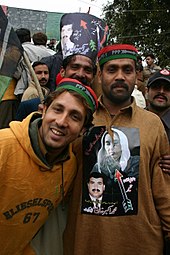Pakistani People's Party
| پاکستان پیپلز پارٹی Pākistān pīplz pārṭī |
|
|---|---|

|
|

|
|
| Party leader | Bilawal Bhutto Zardari |
| Deputy Chairman | Asif Ali Zardari |
| founding | November 30, 1967 |
| Headquarters | Islamabad |
| Alignment | Social democracy |
| Colours) | Red, black, green |
| senate |
20/104 |
| National Assembly |
55/342 |
| International connections | Socialist International |
| Website | ppp.org.pk |
The Pakistani People's Party ( Urdu پاکستان پیپلز پارٹی Pākistān pīplz pārṭī , PPP ; English Pakistan Peoples Party ) was founded on November 30, 1967 by the landowner Zulfikar Ali Bhutto as a moderate socialist party.
“Our religion is called Islam, our political order is called democracy, our economic system is called socialism” and “ Roti, Kapra, Makan ” (food, clothing, housing) were chosen as the programmatic motto . The party chairman has been Bilawal Bhutto since the end of 2007 .
It probably goes back to the Indian National Congress from the British colonial times. The founders included upper-class citizens and agriculturists who, however, also pursued socialist interests such as land reform and nationalization.
The party's power base is in the southern Sindh province , which is home to the Bhuttos dynasty .
history
In 1971, after the defeat of (West) Pakistan in the civil war against Bangladesh (former East Pakistan), Zulfikar Ali Bhutto came to power with the party. The Bhutto government was overthrown in 1977 by General Mohammed Zia ul-Haq ; two years later Bhutto was executed . After Zia ul-Haq's death in 1988, the PPP, headed by Zulfikar Ali Bhutto's daughter Benazir , won an election. From 1988 to 1990 and again from 1993 to 1996 it was the government.
After his return from exile in Damascus in November 1993, Benazir's brother Murtaza Bhutto asserted his claim to the party leadership. He organized his supporters in the PPP / SB (Pakistan Peoples Party / Shaheed Bhutto) party, which was positioned to the left of the PPP , but remained in the clear minority. After he was shot dead by the police in Karachi on September 20, 1996 , his widow Ghinwa Bhutto took over.
In addition, the PPP-S, named after its leader Sherpao, and the National People's Party split off on August 30, 1986.
Within the PPP the group Tabqati Jeddojudh , which comes from the Trotskyist tradition, is active, which belongs to the international alliance International Marxist Tendency (IMT) . One of its members was elected to parliament as a candidate on a PPP ticket in the 2002 elections.
In 2006, the Pakistani People's Party formed an Alliance for the Restoration of Democracy with the Pakistani Muslim League (PML-N) of former Prime Minister Nawaz Sharif .
In the 2008 parliamentary elections , the PPP became the strongest force in the National Assembly . The Pakistan Muslim League Quaid-e-Azam (PML-Q) , which is close to President Musharraf , had lost its supremacy in parliament and became only the third strongest force. The PPP and Sharifs PML-N agreed to form a joint government, the former minister and parliamentary president and vice-chairman of the PPP, Yousaf Raza Gilani, was elected as prime minister . Six weeks after the new government was sworn in, however, there was a serious crisis when the PML-N ministers unanimously announced their resignation. The background to this were disputes over the reinstatement of the judges who were dismissed by President Musharraf during the state of emergency in autumn 2007. Despite the resignations, the PML-N wanted to continue to support the government, according to Nawaz Sharif.
literature
- Tariq Ali: Pakistan: A state between dictatorship and corruption. Diederichs Verlag, Munich 2008, ISBN 978-3-7205-3059-0 .
Web links
Individual evidence
- ^ Leftist Parties of Pakistan
- ↑ Die Zeit : Pakistan: Triumph for Bhutto Party ( Memento of the original from January 18, 2012 in the Internet Archive ) Info: The archive link was inserted automatically and has not yet been checked. Please check the original and archive link according to the instructions and then remove this notice. dated February 19, 2008.
- ↑ Die Zeit : United Against Musharraf, March 10, 2008.
- ^ Tagesschau : New opponent for President Musharraf from March 24, 2008.
- ^ The Press : Pakistan: Government on the Edge, May 13, 2008.
